 Petzlover
Petzlover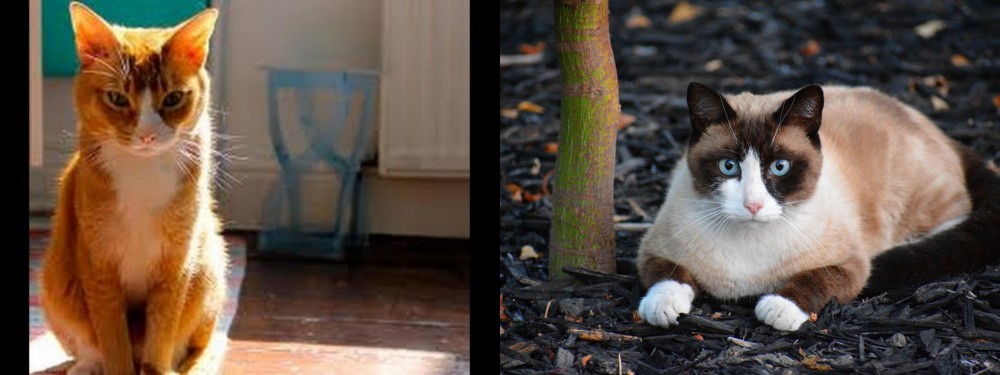 Chausie is originated from Egypt but Snowshoe is originated from United States. Both Chausie and Snowshoe are having almost same weight. Both Chausie and Snowshoe has almost same life span. Both Chausie and Snowshoe has same litter size. Both Chausie and Snowshoe requires Low Maintenance.
Chausie is originated from Egypt but Snowshoe is originated from United States. Both Chausie and Snowshoe are having almost same weight. Both Chausie and Snowshoe has almost same life span. Both Chausie and Snowshoe has same litter size. Both Chausie and Snowshoe requires Low Maintenance.
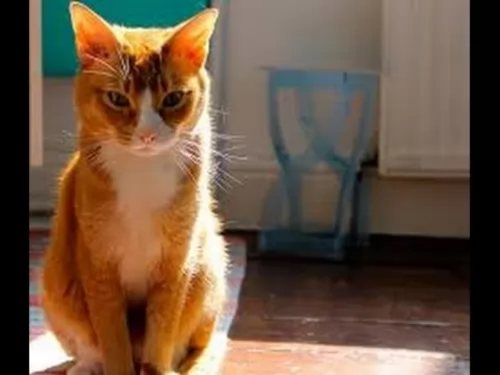 The Afro-Chausie came about from breeding a few individuals from a species of jungle cat which was native to India, Asia and the Middle East. In other words, this is a cross between a wild cat and a domesticated cat.
The Afro-Chausie came about from breeding a few individuals from a species of jungle cat which was native to India, Asia and the Middle East. In other words, this is a cross between a wild cat and a domesticated cat.
It was only in 1995 that the Chausie was recognized as a domestic breed, and by the International Cat Association.
The Chausie breed essentially began in the 1990s, when breeders name the breed Chausie and also developed a breeding program. They received registration status in 1995. Chausies are bred in North America and Europe and in 2003 became a new breed in the United States.
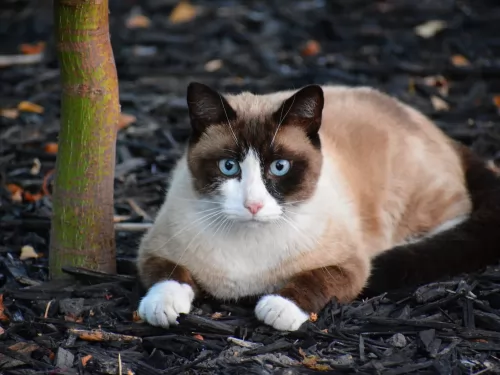 The Snowshoe is a short-haired, natural breed of cat. It is a bit similar in looks to the Siamese cat.
The Snowshoe is a short-haired, natural breed of cat. It is a bit similar in looks to the Siamese cat.
It was in the late 1960's that Dorothy Hinds-Daugherty from the USA devoted her time to developing a breed which was a mix of Siamese cat and American Shorthair. There was much enthusiasm for the new breed – the mesmerizing blue eyes and the lean, lithe, athletic body, .
This rare cat has been approved for championship status. In 1982 the Snowshoe was approved for championship status by the CFF and later by the American Cat Fanciers Association in 1990.
This beautiful cat has strict standards laid down for breeding.
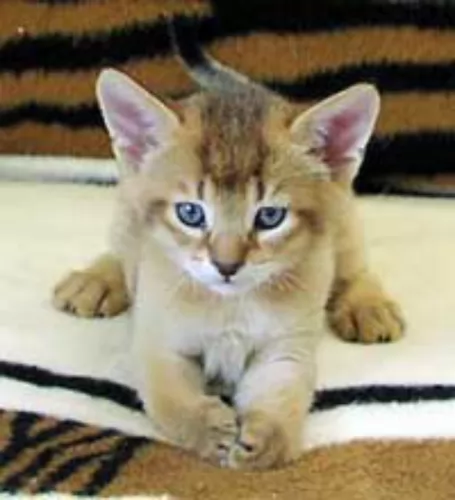 The Chausie is a medium to large cat with a long body and long legs. In fact, the hind legs are somewhat longer than their front legs, and they’re able to easily leap into the air and up onto high perches. Some people say these cats look like Pumas.
The Chausie is a medium to large cat with a long body and long legs. In fact, the hind legs are somewhat longer than their front legs, and they’re able to easily leap into the air and up onto high perches. Some people say these cats look like Pumas.
The adult Afro-Chausie can weigh between 5 to 9kg and they stand in height from 35cm to 45cm and sometimes taller, both male and female.
The ears of the cat are broad and tall and the almond-shaped eyes are a yellow to green shade. The TICA Chausie breed standard says that the cat comes in 3 colors – a black/brown ticked coats, solid black and black grizzled tabby, but in fact, they come in quite a few other colors and patterns too.
Your Afro-Chausie is an intelligent, loyal, social and athletic cat that is also playful. They love their human companions and will form a deep bond with them, making it difficult to rehome him later on.
They don’t like being alone, in fact to such an extent that they will befriend dogs in the home too. This is such an active cat and you can even train him to walk on a leash.
It’s a cat that also loves water and Similar to Bengals and Savannahs, this breed, too, enjoys water. This cat will form deep bonds with owners, hence rehoming has been known to be particularly challenging with this breed
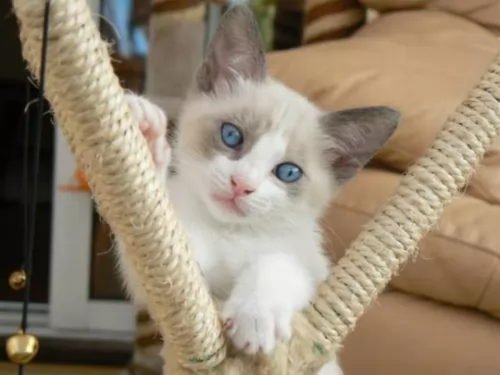 The Snowshoe is a medium-sized cat, with the body being longer than many other cat breeds.
The Snowshoe is a medium-sized cat, with the body being longer than many other cat breeds.
A distinctive feature with him is the white paws.
The cat can weigh between 5 to 7 kg. The legs of the cat are long and strong and the medium-length tail gradually tapers to a tip. The ears are fairly large with rounded tips. The smooth, short coat is white, brown, tan, and black and without an undercoat. He reminds you of a sweet treat - hints of chocolate and coffee shades with vanilla or light cream. He is pure white at birth, but after a few weeks, the coat undergoes a significant color change.
The face, ears, tail, and legs are darker in color than the rest of the body. The eyes of all Snowshoe cats are a sky blue.
Snowshoes are friendly, docile, and affectionate. They lap up the company of their human family, getting on well with children and other pets. They tend to be shy of strangers.
The Snowshoe is a fairly vocal cat and will let you know when he is hungry or he just wants to talk to you.
These cats are intelligent too and he can be taught a few tricks. He is very sociable and doesn’t like to be left on his own for long periods of time. Ideally, these cats should have a constant companion. They are active cats and like to be busy. You’ll need to spend some time with your Snowshoe as these cats love fun and games.
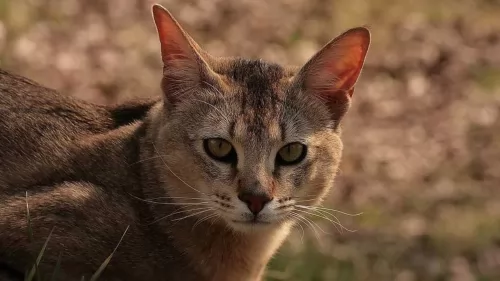 The Chausie loves human contact and they love games with their human family.
The Chausie loves human contact and they love games with their human family.
They’re intelligent and are constantly looking for things to do. They are athletic and have plenty of energy. They’re social, playful and make great playmates for children who have been taught to respect animals.
When you bring an Afro-Chausie into your home, you can expect to have a lot of action and entertainment with this beautiful cat.
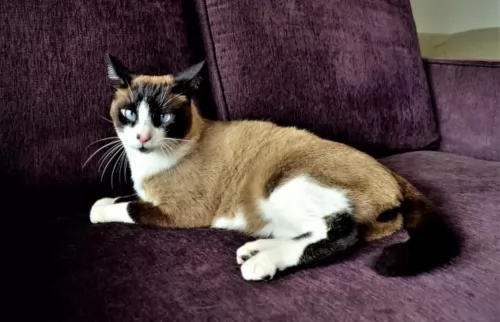 People who have already owned Snowshoes will tell you that they make splendid pets. They’re loyal and devoted to their human family, usually choosing a favorite person.
People who have already owned Snowshoes will tell you that they make splendid pets. They’re loyal and devoted to their human family, usually choosing a favorite person.
The fact that the Snowshoe is social and becomes so attached to people, makes him an awesome pet but just because he is fairly docile and amicable doesn’t mean he should be left alone for hours at a time. You’ll hear him voicing his displeasure at this.
He is certainly not a solitary cat, but an affectionate and most extraordinary cat.
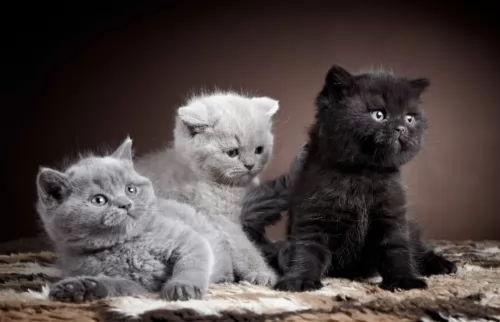 With good health, your Afro Chausie can live to be anything between 12 – 16 years of age. These cats are prone to developing food allergies, and this is why it is important to feed your Chausie high-quality food.
With good health, your Afro Chausie can live to be anything between 12 – 16 years of age. These cats are prone to developing food allergies, and this is why it is important to feed your Chausie high-quality food.
They’ve got fragile digestive systems and many are gluten intolerant.
All kinds of parasites can invade your Afro-Chausie’s body – internally and externally so be sure to have your Chausie checked over for parasites such as tick and fleas, worms and mites.
Check your Chausie for putting on too much weight as these cats have a huge appetite.
You just have to bear in mind that these cats can develop any of the illnesses that other domesticated cats get
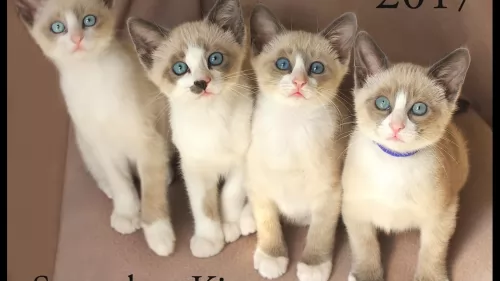 Your Snowshoe may well be a healthy breed, but every cat is prone to some illnesses. We look at some cat diseases you need to be aware of -
Your Snowshoe may well be a healthy breed, but every cat is prone to some illnesses. We look at some cat diseases you need to be aware of -
This is a feline disease found more often in Siamese cat breeds. The cat develops this protein disease between 1 TO 5 years of age. Amyloidosis is when there is an abnormal deposit of the protein complex amyloid into the liver, spleen and kidneys, resulting in bacterial infections, inflammation, and cancer.
Your Snowshoe’s teeth are particularly prone to gingivitis which is inflammation of the gums. It can lead to more serious conditions if left unattended. Other dental problems to watch for are bleeding gums, broken teeth, and swelling of the gums.
Have your Snowshoe spayed or neutered. Spaying or neutering decreases the likelihood of some cancers. Both males and females are less likely to roam too, making them more domesticated. The cat is less likely to spray urine as a territorial gesture too. Spaying or neutering is imperative if you want to avoid your cats being parents.
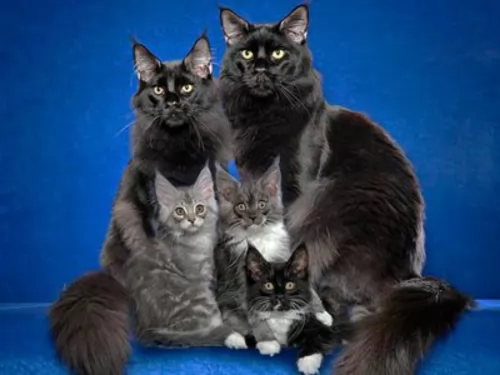 With their short coats, they only need to be brushed once a week as they are moderate shedders.
With their short coats, they only need to be brushed once a week as they are moderate shedders.
Provide your cat with a quiet place to sleep and which is comfortable and dry.
A cat tree can be useful for allowing your cat to climb and scratch.
Chausies are essentially meat-eaters. They don’t want to eat fruit and nuts. One of the Chausie’s ancestors was a wild cat and this is why they don’t eat the same foods as what your dog does.
Every cat thrives on a high-protein, low-carbohydrate diet. A dog’s diet with scraps from the table as well as human food can be fatal for your Chausie if it becomes your cat’s regular food.
He requires a diet of quality meat – beef, chicken, fish and organs – all foods that are easily digestible for your cat. Cats also need taurine from muscle meat such as shellfish and fish.
Always make sure your Chausie has access to a constant supply of fresh, cool water.
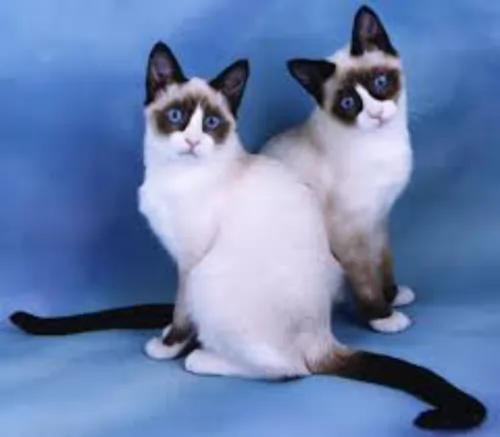 Provide your Snowshoe with the best cat food that there is. Always be aware of excess weight with your cat and avoid it at all costs. Extra weight is an influential factor in the development of diseases such as diabetes and arthritis.
Provide your Snowshoe with the best cat food that there is. Always be aware of excess weight with your cat and avoid it at all costs. Extra weight is an influential factor in the development of diseases such as diabetes and arthritis.
A proper diet for your Snowshoe will ensure that your vet expenses are less. The nutritional needs of your Snowshoe will be protein, minerals, vitamins, fatty acids, and enzymes. Your cat is a carnivore and his food needs to be high in meat and protein. He isn't going to require any carbohydrates. Speak to your vet about the best food for your feline friend.
Provide your Snowshoe with a constant supply of fresh, cool water.
Your Snowshoe will appreciate some cooked meat once in a while. Some tasty tuna now and then which is rich in omega-3s will also go down well.
Cats are fastidious about cleanliness so ensure his litter box is always clean. Scoop out the feces every day.
The Snowshoe has a low maintenance short coat, and a weekly brush will keep his coat shiny and glossy and he’ll love the attention this brushing session provides.
Cats like to scratch, so provide your Snowshoe with a scratching post as this will save your furniture from being used as a scratching post.
The Snowshoe cat is regarded as a low maintenance cat in terms of his short coat which needs to be brushed once a week. Brushing the hair will remove dead, loose hair and distribute skin oils to keep the coat in tip-top condition.